Helping the Homeless to Help Themselves
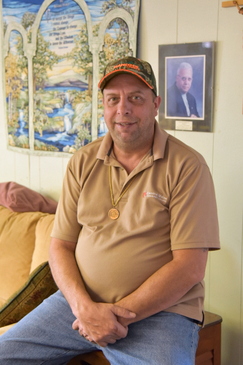
“In a few months, I’ll be picking up 16 years,” he says. “I don’t even think about using anymore.”
Scott has worked hard to put a troubled life behind him. He credits, in part, the help of the Saint Martin de Porres Residence, which serves homeless men and women in Lewiston, and the residence’s founder, Brother Irénée Richard, O.P.
“I could never do enough to pay him back for what he did for me,” Scott says.
Scott, who has worked at Saint Martin de Porres for seven years now, says he knows the difference that the residence can make in people’s lives. He has witnessed it, and he has lived it.
“I came from where these people come from,” he says. “They come in and say, ‘Can you help me?’ And I say, ‘Yes.’ And you can see the hopelessness disappear in their faces. I can’t describe that feeling. I know that feeling. There are no words to say how big that is on the soul.”
Scott, who is originally from Lynn, Mass., says he began drinking at age 13, the consequence of a troubled home life. Drug use followed.
“It was a very rough life. At the age of 17, I was kicked out of my home. I lived on the streets from that point on, until I was 36 years old,” he says.
Scott says an arrest on a drug charge led to a work program and the road to sobriety. At the invitation of his sister and with a desire to escape the environment he feared would cause him to relapse, he came to Maine. After living with his sister for a short time, he moved in with a girlfriend. It was a falling out with her in 2007 that threatened to unravel the work he had done.
“I felt like I was in that helpless state of mind again. Here we go. I’m back on the streets,” he says. “It’s hard for me to humble myself and ask for help, but I didn’t know what to do. I was lost, and Brother took me in.”
Scott says the residence gave him a place to start over and provided him the connections to help him do it.
“It got me started,” he says. “When I was ready for help, and I was willing to accept that help, they helped me, and my life has been different ever since.”
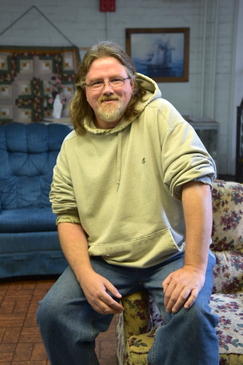
“My life is completely different from what it was prior to coming here,” he says.
Jim spent 35 days at the Saint Martin de Porres Residence in 2012. He says he was going through a divorce and not coping well. Although he had stopped using drugs years earlier, he says he had replaced them with addictions to video games, the Internet, and sex.
“It wasn’t physically killing me, but it was just making me into a person that I didn’t like. I’m so glad that I’m not that person anymore,” he says.
Jim credits the Twelve Hour Club, a former sober social club in Lewiston, along with the residence, for helping him to get his life under control.
“It was a combination,” he says. “It wasn’t until I started going to meetings at the club and talking with the old timers there, and acknowledging, ‘Hey, I’ve got a problem. I need to fix this.’”
He says support from the residence and the meetings gave him the positive momentum he needed, and soon, he had a small apartment of his own and was volunteering at the club.
“When I came here, I was lost,” he says. “This place put me on my path.”
Jim and Scott are not alone. Since Brother Irénée founded the residence 25 years ago, it has served approximately 3,700 guests. From the beginning, the mission has been the same.
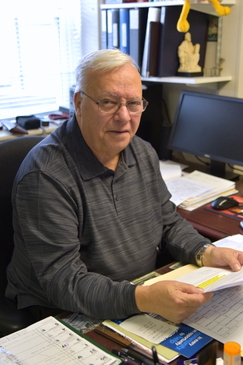
Brother Irénée says his inspiration for opening the residence came from a homeless man named Alan, whom he met 30 years ago and came to know over a three-year period. Brother Irénée remembers the reaction he received after inviting Alan to regularly join him for supper.
“I told him, ‘After work, you come to the priory here, and we’ll have supper, because I think it’s important that you have at least one good meal a day. So, I’ll wait for you for supper.’ And these were his words: ‘You are going to wait for me?’”
Then, when Alan asked why Brother Irénée was helping him, Alan seemed to struggle with the answer he received.
“I said, ‘Well, it’s because I care about you, and I love you.’ And his face just dropped. And I said, ‘Did I say something wrong?’ He said, ‘I don’t know what love is.’”
Brother Irénée says after leading a youth retreat at the Lazarus House, a shelter in Massachusetts, he knew the path he was called to take. At the end of the retreat, when participants were invited to share something with the group, he announced, ‘I am committing myself today to bring this program to Lewiston.’”
“The whole thing felt good. And I said, ‘Yes, this is what I want,’” he recalls.
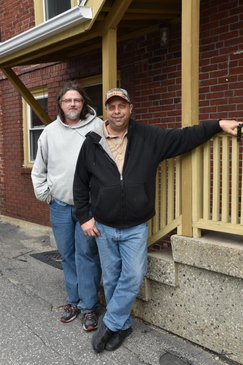
“It was all positive,” he says.
The residence serves up to 10 people at a time, and it accepts both men and women. Clients must have a referral from another agency and go through an intake process to determine if they’re willing to follow the rules and commit to trying to improve their situations.
The approach, Jim says, depends on the guest.
“We don’t just talk at people and tell them what to do. We actually engage with them. We relate with them,” says Jim. “It’s definitely a personal thing. There is no one answer for it. You have to approach each as a unique person.”
He and Scott say their own experiences help them see things from the guests’ perspectives.
“Everybody who works in that office now, be it second shift or overnight shift, they have slept in these beds at one point or another, so they know exactly where they’re coming from,” says Scott. “Most of us have been through recovery, have struggled with the same demons, the same problems.”
“People can go to school to become social workers, crisis workers, but there is only so much you can learn from a textbook,” says Jim. “It’s the little stuff that takes a shelter environment from being impersonal to something that they feel comfortable in, safe.”
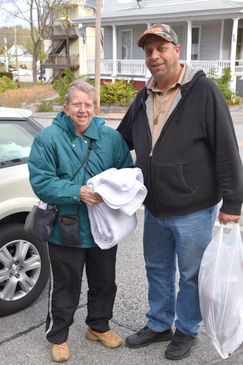
“Like I tell the guests at intake, ‘If you ever leave the table hungry, it’s your own fault,’” says Jim.
Demand for the shelter’s beds has increased through the years, especially among women. It is why Brother Irénée says the time has come to open a separate building for them. It will be called the Saint Catherine of Siena Residence and, if all stays on track, will be located in the former Saint André Group Home in Lewiston, which was affiliated with the Good Shepherd Sisters of Quebec.
“This idea of a women’s shelter has been brewing for quite a while, and I found out Saint André’s Group Home had to close because of cuts in government funding. So I said, ‘Hmm. I wonder.’”
He contacted the Good Shepherd Sisters of Quebec and the Saint André Group Home Corporation, and he learned they were willing to sell the home for $125,000. In the meantime, he says an unsolicited donation came in for $50,000. As when the first residence opened, everything has come together.
“That came from the sky. I did not ask for that,” says Brother Irénée. “I looked at my assistant, Bernie, and said, ‘This is scary. This is exactly what happened with this place.’”
With that $50,000 and another $3,000 the residence had in reserve, Brother Irénée contacted Saint André’s executive director, wondering how to proceed. He says he is still amazed at what happened next.
“The Board of Incorporators, which is the Sisters of the Good Shepherd, voted to let the house go for $75,000, and they were giving me two years to pay off the $23,000. I just couldn’t believe it. I said, ‘This is too much!’”
Brother Irénée then wrote to Sister Diane Beaudoin, S.C.S.H., superior general of the Sisters of Charity of Saint Hyacinthe, who have been generous supporters of the residence since it opened, asking if they might be willing to make a contribution.
“I said, ‘This is what is happening. There is a need, and we have this house.’ And they sent me $30,000,” he says. “The house is paid with a little left over.”
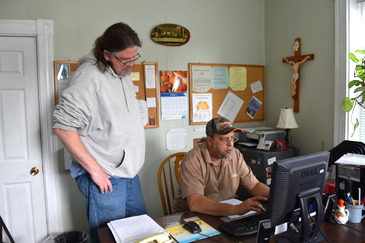
“This is from God. This is just too much. It is too much. I should write a book, ‘What God wants, God gets’ should be the title,” he says.
Some regulatory approval is still needed, but Brother Irénée hopes the Saint Catherine of Siena Residence will open in early 2017.
Brother Irénée says it is hard to believe that the Saint Martin de Porres Residence has been welcoming guests for 25 years now. For all that time, it has relied almost entirely on donations and proceeds from its thrift store. Other than a FEMA grant, it gets no government funding.
“We are here by the grace of God, and I mean that,” he says.
While not all who stay at the residence are able to turn their lives around, there are many success stories. You have to look no further than Jim and Scott. The two are now helping Brother Irénée computerize all 25 years of his files. Scott owns a home in Greene, earned his GED, and is taking classes at Central Maine Community College. He hopes, one day, to start his own business and would like to be able to offer transitional housing for guests after they leave the residence.
“You come over here; you get stable; and then you go over there, get a job, pay rent,” he explains. “I dream big.”
For now, both Scott and Jim are happy to be working with Brother Irénée as he continues his mission to help the homeless help themselves.
“I always want to help people. And once I found myself finally stable enough, straight enough, sober enough to help people, when Bob (Coffey, a former employee) offered me the job in 2015, I said, ‘Yes. I’ll do it,’” says Jim. “I like being here. Working in a homeless shelter is something that I wanted to do for years.”
“I came from where these people came from, and being able to help them is really important to me,” says Scott. “I’m just amazed at how powerful this one little shelter is. What they do here is really, really amazing.”










